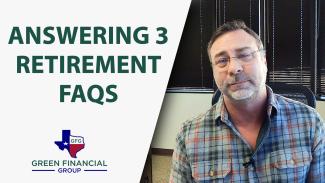
Tackling the 3 Most Common Questions We Receive
How We Can Help You | Book an Initial Consultation
At Green Financial Group, we work with a lot of retirees, and we tend to get three common questions from almost everyone we work with:
1. “Can I afford to retire?” We run feasibility studies for our clients to answer the question of affordability when it comes to retirement. If you can’t afford to retire, then don’t retire; it’s not about how much money you have but rather the demand you’re putting on the money you have. Someone with $1 million can retire just as well as someone with $500,000 or $10 million. All that matters is the amount of cash flow and the level of strain they’re putting on their portfolio.
Of course, the amount you start with will determine what your income will be, but a good rule of thumb is 4%. If you retired with $1 million and had a 4% cash flow, you’d get about $40,000 a year.
2. “When do I take social security?” It differs for everyone; there’s no set solution. However, every so-called social security expert I’ve spoken to has said to wait until the maximum benefit age. The issue is that those experts look at social security in a vacuum. Suppose you were going to get $30,000 a year in social security; if you waited until the maximum benefit age to get that money, where will the money come from before that? It’ll come from your portfolio. So by pulling that money out, you’re killing the goose that lays the golden eggs.
Now, does that mean you should take it earlier? I don’t know, as there are a lot of factors that go into determining the best time to take social security. I recommend that you speak with a financial advisor who will do some analysis to help figure out your best move.
3. “Do I pay off the house?” Right now, mortgage rates are at all-time lows. Let’s say you have a 2.5% rate for your mortgage and $100,000 left to pay off the house. Do you think you’d make more than 2.5% on that $100,000 in the market? If you think you can, you’re better off investing the $100,000 to earn more than 2.5%.
Of course, there are no guarantees. You also need to address where the $100,000 is coming from. If it comes from outside of a qualified plan, that’s great! If it comes from inside an IRA, that money is taxable, so you’re losing the potential tax-deferred growth of the money that was sitting in your IRA to pay off a mortgage. Some debts are good; you can still write off some mortgage interest on your houses and taxes.
"By pulling your social security out, you’re killing
the goose that lays the golden eggs."
If you have any questions about today’s topic, don’t hesitate to reach out to us. We’d be happy to speak with you.
The information contained in this blog does not purport to be a complete description of the securities, markets, or developments referred to in this material. The information has been obtained from sources considered to be reliable, but we do not guarantee that the foregoing material is accurate or complete. Any opinions are those of the author, and not necessarily those of Raymond James. Expressions of opinion are as of this date and are subject to change without notice. There is no guarantee that these statements, opinions or forecasts provided herein will prove to be correct.
Every investor's situation is unique and you should consider your investment goals, risk tolerance and time horizon before making any investment. Investing involves risk and you may incur a profit or loss regardless of strategy selected. The forgoing is not a recommendation to buy or sell any individual security or any combination of securities. Be sure to contact a qualified professional regarding your particular situation before making any investment or withdrawal decision.
